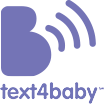Learn More About Your Pregnancy
Why Baby Should Not Watch TV
Q:
I've heard that my baby shouldn't watch any TV, but sometimes I like having it on in the background. Is that ok?
No
Correct!
Having the TV on in the background may delay language development. Typically, a parent speaks about 940 words per hour around a toddler. When the TV is on, that number falls to 170 words! Fewer words mean less learning for your baby.
Yes
Incorrect!
Having the TV on in the background may delay language development. Typically, a parent speaks about 940 words per hour around a toddler. When the TV is on, that number falls to 170 words! Fewer words mean less learning for your baby.
Pediatricians recommend that babies under the age of two not watch TV. Parents are often surprised by this! Surveys tell us that about 40% of babies have watched sort of video by age five months, and by age two, the number rises to 90%.
Early brain development
Kids’ brains grow a lot during the first three years of life. Your baby’s brain grows to three times its size in the first year alone. During this time, you will want to ensure that your baby is learning from the real world, because this is better for brain growth than simulated learning from TV and electronics.
Here is an example – think about a ball in real life compared to a ball on TV. Infants are developing three-dimensional vision. On TV, the ball is two dimensions, so the ball is just a flat, shaded circle. In real life, when you roll a ball across the floor, it moves in a single motion, slowing gradually until it stops. The same action on TV is broken up—you see the ball leave someone’s hand, then there’s a shot of it in motion, then a picture of the ball at rest. If your infant wants to grab a ball in real life, they‘ll move for it, grab it, or crawl after it. The ball on the screen just disappears, to be replaced by something else, and you can never get your hands (or mouth) on it.
Infants may stare at the bright colors and motion on a screen, but their brains don’t know what it all means. It takes two full years for a baby’s brain to develop to the point where they know that what they are seeing on the TV is also what exists in real life.
There is also research and evidence that shows that TV watching before age two has lasting negative effects on children’s language development, reading skills, and short–term memory. It also contributes to problems with sleep and attention.
Sometimes TV may seem like an easy way to entertain your child if you must get something done, but find a friend, toy, stationary activity center, or room with no dangerous objects and just let your baby move instead. It will do great things for your baby’s brain development!

